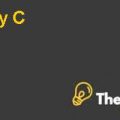Q1 (a):
The least risky combination of assets is calculated by finding out the standard deviation and variance of security A and security B by creating 3 scenarios for best, worst and base case. Jonathan can get the best option for obtaining the combination for less risky asset which turns out to 23.27% and the weightage should be given in such a way that more investment falls under security B which is around 85% and only 15% investment in security A. If we look at the variances, this weightage will provide a minimum portfolio variance of 10.41% which is lower than the individual risk of security A and security B. However, it will be riskier if 25% of the total amount is invested in security A and 75% in security B.
| Scenario Summary | |||||
| Current Values: | Base | Best | Worst | ||
| Changing Cells: | |||||
| WA | 25% | 85% | 15% | 25% | |
| WB | 75% | 15% | 85% | 75% | |
| Result Cells: | |||||
| Standard Deviation | 37.99% | 33.63% | 32.27% | 37.99% | |
| Scenario Summary | |||||
| Current Values: | Base | Best | Worst | ||
| Changing Cells: | |||||
| WA | 25% | 85% | 15% | 25% | |
| WB | 75% | 15% | 85% | 75% | |
| Result Cells: | |||||
| Variance | 14.43% | 11.31% | 10.41% | 14.43% | |
Q1 (b):
Jonathan has the minimum portfolio return requirement of 10% and he is willing to invest in the risk free assets to minimize theportfolio risk by performing sensitivity analysis. It can be analyzed from the following tables that the portfolio return will be 9.60% if Jonathan invests 30% in security A and 40% each in security B and risk free asset which will not be providing the minimum portfolio return requirement. Hence, it will not be consideredmore risky in terms of standard deviation and variance. However, Jonathan will be getting best out of his investment with more required rate of return along with bearing less risk in terms of its standard deviation and variance. Jonathan will be earning 10.53% by investing 55% in security A, 20% in security B or 25% in security B which will be varying at a standard deviation of 17.27% and variance of 2.98%.
Investment and Portfolio management Harvard Case Solution & Analysis
| Scenario Summary | |||||
| Current Values: | Base | Best | Worst | ||
| Changing Cells: | |||||
| WA | 30% | 40% | 55% | 30% | |
| WB | 40% | 35% | 20% | 40% | |
| WRF | 40% | 25% | 25% | 40% | |
| Result Cells: | |||||
| Return | 9.60% | 10.08% | 10.53% | 9.60% | |
| Scenario Summary | |||||
| Current Values: | Base | Best | Worst | ||
| Changing Cells: | |||||
| WA | 30% | 40% | 55% | 30% | |
| WB | 40% | 35% | 20% | 40% | |
| WRF | 40% | 25% | 25% | 40% | |
| Result Cells: | |||||
| Risk | 19.91% | 17.91% | 17.27% | 19.91% | |
| Scenario Summary | |||||
| Current Values: | Base | Best | Worst | ||
| Changing Cells: | |||||
| $J$9 | 30% | 40% | 55% | 30% | |
| $J$10 | 40% | 35% | 20% | 40% | |
| $J$11 | 40% | 25% | 25% | 40% | |
| Result Cells: | |||||
| $J$18 | 3.97% | 3.21% | 2.98% | 3.97% | |
This is just a sample partial work. Please place the order on the website to get your own originally done case solution.













